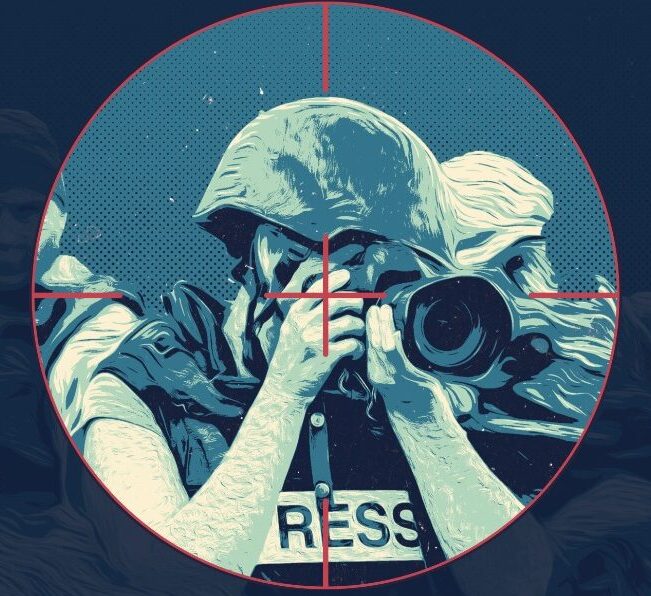Editor’s Note: In this guest blog, Rawan Damen, Director General of our Independent Journalism & Media partner Arab Reporters for Investigative Journalism (ARIJ), shares how they have been working to support journalists in Gaza, highlighting many of the challenges they continue to face amid the ongoing war. Humanity United is committed to sharing our platform with those with lived experience in our areas of work; however, the views and opinions expressed are those of the author.
As the year anniversary approaches for the war on Gaza, the situation continues to worsen daily, reaching unimaginable levels of severity. Consequently, conditions for journalists covering the war while living through it have become increasingly dangerous. In recent weeks, the situation has escalated into the occupied West Bank, placing journalists at heightened risk due to the ongoing Israeli military occupation and settlers’ attacks.
As of Oct. 2, preliminary investigations by the Committee to Protect Journalists (CPJ) indicated that at least 116 journalists and media workers were among the more than 42,000 Palestinians killed since the war began, marking this period as the deadliest for journalists since CPJ began collecting data in 1992. According to documentation from the Palestinian Journalists’ Syndicate, at least 165 Palestinian journalists have been killed, 190 injured, 51 imprisoned, and 87 media institutions have been damaged. This grim reality has led many to question whether Palestinian journalists can — or should — continue working amid such extreme risks. As a result, the responsibility of reporting on the conflict is increasingly falling on a shrinking group of journalists who are in desperate need of support.
Since the start of the war, we at Arab Reporters for Investigative Journalism (ARIJ) have been closely following the daily hardships and losses experienced by Palestinian journalists and, given our 17-year history of supporting journalists and fact checkers across the Arab World, we felt compelled to assist our community of journalists in Gaza.
In December 2023 we launched an ongoing crowdfunding campaign to support journalists in Gaza. The funds raised through this campaign, along with support from donors and partners, has allowed us to help approximately 250 journalists by replacing their equipment and providing humanitarian assistance. And as all borders are closed and equipment is not allowed in, we are purchasing everything from within the Gaza Strip, where prices have skyrocketed.
Several months ago, we constructed a tent near Al Aqsa Hospital in Deir al-Balah in the central Gaza Strip as a communal workspace for journalists, undertaking a major renovation project that included professional design, the construction of wooden workstations, the installation of a comfortable padded bench, the provision of 24/7 power and internet access, and the creation of a designated area for correspondents to conduct live broadcasts. The journalists expressed profound gratitude after this project’s completion, noting how it facilitated their work and made them feel supported and recognized.
We were also able to extend our support to journalists in the northern regions of Gaza, which we consider a significant achievement given the challenging access to that area. Journalists there received phones, laptops, cameras, lenses, and humanitarian aid from ARIJ.
In June we partnered with Forbidden Stories and collaborated with 12 other newsrooms to launch a series of investigations detailing how Israel is targeting journalists and media offices. Also, through our Arab Fact Checkers Network we have supported and connected Palestinian fact checkers to fact checkers in 60 countries.
The challenges we face in supporting journalists in Gaza have been immense. We have received more than 500 applications, each telling a heartbreaking story of loss, displacement, injury, and desperation. As the war continues, these requests for assistance have only intensified, with many journalists who were previously supported now finding themselves in even more dire situations.
The journalists face daily struggles to secure water, food, and money amid skyrocketing prices. The closure of the Rafah crossing between Gaza and Egypt has exacerbated shortages of essential supplies.
As tensions rise and nerves fray under the strain of war, we have received more feedback from journalists who have not received support, questioned our selection process or complained they have been waiting months for equipment. All applicants must submit requests through a standardized form, providing detailed information about their work, uploading identification, sharing work samples, and offering more context about their situation and needs. We are forced to make very tough decisions on priorities, when every single journalist in Gaza is a priority.
Despite these challenges, we know that this work continues to have an impact. We are deeply grateful to the individuals from all around the world who contributed. We also extend our sincere thanks to our donors and partners, including Committee to Protect Journalists (CPJ), Reporters Without Borders (RSF), the Ford Foundation, and others, for their generous support in aiding journalists in Gaza.
Finally, none of this would have been possible without the work of many individuals and organizations including ARIJ’s Executive Editor, Hoda Osman, who has been leading this effort from day one; Palestinian organization MediaTown, led by Gaza’s award-winning filmmaker Ashraf Mashharawi; ARIJ’s team which vets journalists on the ground and checks sanctions lists; and our finance team and board.
Looking ahead, we remain unwavering in our commitment to supporting Palestinian journalists in Gaza, constantly adapting our strategies as needed. The resilience and dedication of these reporters, who work under unimaginable conditions, continue to inspire our efforts despite the immense challenges. As the only leading regional organization providing direct support to journalists on the ground in Gaza, we persist in our work, even as many international organizations are unable to operate due to safety and political constraints.
As war continues to rage on, the call to action is clear and the urgency is undeniable: Support journalists in Gaza.
